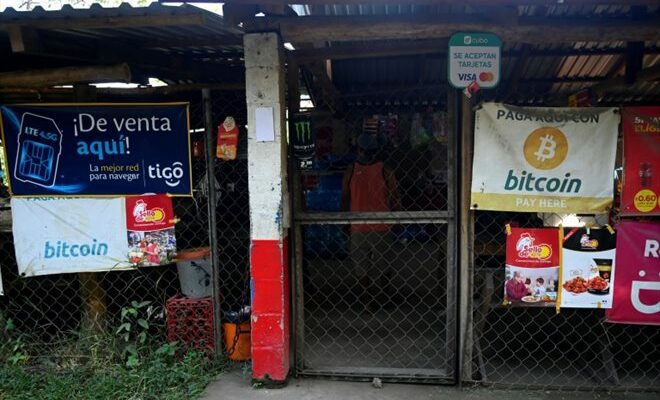A seller prepares tortillas on her street stand during the presidential and legislative elections, in Soyapango, February 4, 2024 in El Salvador (AFP/Camilo FREEDMAN)
Salvadorans have renewed their confidence in Nayib Bukele, triumphantly re-elected on Sunday in the first round of the presidential election, grateful for his “war against gangs”. But analysts say economic woes predict the end of the honeymoon.
“His second term will be problematic because the people’s expectations will not be met on an economic and social level. There could be disappointment,” independent Salvadoran economist Cesar Villalona predicted for AFP.

Police officers in a street in San Salvador during the presidential and legislative elections, February 4, 2024 (AFP/YURI CORTEZ)
While Salvadorans praise a record-low homicide rate in the small Central American country once considered among the most dangerous in the world, they are getting used to a life without the fear of extortion and maras violence.
“The security situation has improved, but the economy is still in bad shape,” analyst Michael Shifter of the Inter-American Dialogue think tank in Washington told AFP. “There are still many Salvadorans leaving the country.”
– “Everything is more expensive” –
On Sunday, Mr. Bukele promised “a period of prosperity”, because “there is no longer any brake on business creation, no more brake on studies, no more brake on work, no more brake on tourism”.

Women eat lunch at a street stand during the presidential and legislative elections in Soyapango, El Salvador, February 4, 2024 (AFP/Camilo FREEDMAN)
But discontent is starting to be felt in the streets.
In terms of “health, education, there needs to be a lot of changes,” Blanca Noemi, 52, a street vendor in the capital, told AFP.
“Everything is more expensive. The cost of basic products has increased,” confirms taxi driver Miguel Juarez, 37, while Elizet Garcia, a 35-year-old housewife, calls for “more opportunities for young people” .
According to economist Cesar Villalona, slowing economic growth and falling agricultural and industrial production bode ill for the future.

The cost of a basket of basic foods – bread, beans, meat, eggs, fruit – has increased by around 30% over the past three years (AFP/Archives/Marvin RECINOS)
The cost of a basket of basic foods – bread, beans, meat, eggs, fruit – has increased by about 30% over the past three years, while the minimum wage has only increased by about 20%. %.
Nearly 30% of Salvadorans live in poverty and nearly one in ten in extreme poverty, according to 2022 figures from the United Nations Economic Commission for Latin America and the Caribbean (ECLAC).

A saleswoman in front of her school supplies store, February 4, 2024 in Soyapango, El Salvador (AFP/Camilo FREEDMAN)
A 2023 US State Department report indicates that around 70% of jobs are in the informal sector, workers who therefore do not have access to state health and retirement benefits.
“The country’s problems go far beyond the question of security,” said Ana Maria Mendez Dardon, director for Central America of the Washington Office on Latin America. “In terms of employment, education and others, there has been no improvement.”
– Growth objective –
Mr. Villalona points to a public debt of around 80% of GDP and the country’s inability to sell bonds abroad to raise funds, or to attract investments.

Salvadoran President Nayib Bukele gives a speech after voting in San Salvador, February 4, 2024 (AFP/Marvin RECINOS)
Conversely, the government had to borrow from international organizations as well as its own central bank and the national pension fund, which further widened the deficit.
With less money in circulation, “consumption capacity decreases” and Mr. Villalona sees “no short-term solution.”
The country is negotiating a loan of around $1.3 billion with the International Monetary Fund (IMF). But Mr. Villalona explains that Bukele is trying to dodge the IMF’s conditions of reducing public spending and increasing consumption taxes, “because this has a political cost.”
According to the US State Department, if the state of emergency in force since March 2022 “contributes to improved consumer confidence and economic optimism”, this has “not yet translated” into significant foreign investments. Partly because “trust in government has weakened” and corruption remains “a challenge”.

Banners indicating that bitcoin payments are accepted at a small store on El Zonte beach, El Salvador, August 27, 2022 (AFP/Archives/MARVIN RECINOS, MARVIN RECINOS)
In an attempt to revitalize the dollarized economy and dependent on remittances from abroad (21% of GDP), Mr. Bukele made bitcoin an official currency in 2021, despite warnings about the extreme volatility of the cryptocurrency by the IMF and the World Bank who are calling for its withdrawal.
GDP in the third quarter of 2023 grew by 2.8%, and the IMF forecasts growth of 1.9% for 2024.
According to Mr. Acevedo, former governor of the Central Bank, now an analyst, only economic growth, at least at the level of the Central American average (2.6 to 3.5%), can “effectively attack poverty “.
And without social investment, “the question of gangs or an equivalent (phenomenon) will reappear in the medium term,” he warns.
© 2024 AFP
Did you like this article ? Share it with your friends using the buttons below.




